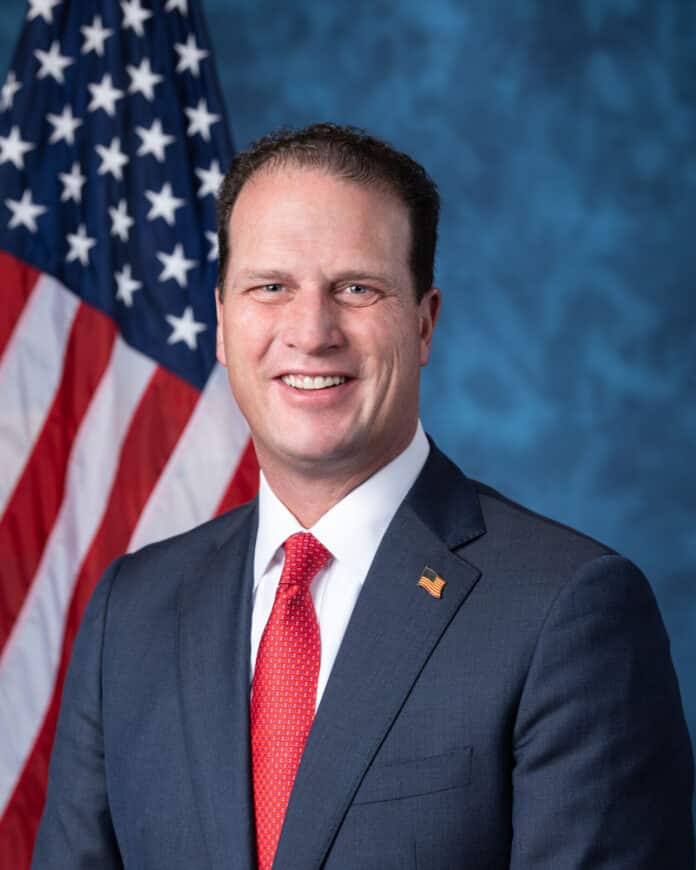U.S. Rep. August Pfluger has a fight on his hands with his recently filed American Energy Freedom Act, which would cut red tape for oil and gas projects and facilitate interstate pipelines between the Permian Basin and Lea and Eddy counties in Eastern New Mexico, among other features.
With the Democrats in Washington holding a 222-213 majority in the House and a 50-50 split in the Senate where Vice President Kamala Harris breaks ties, the San Angelo Republican concedes that it is a tough go.
But he says there are enough Democrats in the energy-producing areas of Texas, New Mexico and other states that his House Resolution No. 7094 should get some bi-partisan support.
Noting that an identical bill has been filed by U.S. Sen. Ted Cruz of Texas, Pfluger said, “This complements my Midland over Moscow bill and it goes a step further in a couple of instances because we are still seeing a full-scale assault on the energy industry by the Biden administration.
“Jen Psaki (the former White House press secretary) said two weeks ago that they were doubling down on their efforts for climate change, so our motivation is to make sure we fight back against all the ways they are weaponizing different things against the industry.”
Pfluger said his proposals will be debated mostly in the House Committee on Energy and Commerce, to which he aspires to be appointed, but some provisions may be considered by other committees.
Just having brought Energy and Commerce Ranking Member Cathy McMorris Rogers of Washington State here to see the oil and gas business up close, he said many members of Congress have accepted his leadership and consult him on energy issues, including several who have signed on as co-sponsors of the American Energy Freedom Act.
Paradoxically, Pfluger said, President Biden encouraged the construction of Russian President Vladimir Putin’s Nord Stream 2 pipeline till Germany stopped it and Biden is asking the People’s Republic of China to build more coal plants while he is killing the Keystone XL Pipeline from Canada and scuttling other domestic projects.
The congressman said he didn’t know why the president and other radical environmentalists see American pipelines as being sinister. “Pipelines are the safest way to move oil and gas,” he said.
“The administration is very misguided on this issue. They’re harming Americans at the gasoline pumps and harming them in the pocketbook. District 11 is the epicenter of geopolitics around the world and we are the solution for easing the inflationary pressures by providing fuels in a responsible, affordable manner.
“My job is to lead the charge in Washington and help the American public see how important the Permian Basin is to our economy and our security.”
Here are the American Energy Freedom Act’s principal features:
>> Prohibit the president from unilaterally enacting leasing bans on federal lands.
>> Eliminate the presidential permit requirement for cross-border energy projects on federal lands and waters.
>> Mandate the on-shore and off-shore oil, gas, wind, solar and geothermal lease sales that have been blocked since January 2021.
>> Expedite permitting and add certainty to the scope of environmental reviews.
>> Reduce foreign dependence for critical minerals by expanding access and streamlining permitting.
>> Require the Federal Energy Regulatory Commission and the U.S. Department of Energy to review permits to export liquefied natural gas within 60 days and immediately approve pending permits to export LNG through 2025.
>> Require FERC and the Army Corps of Engineers to complete permitting for interstate natural gas projects in one year or less and prohibit the rejection of a natural gas pipeline if the project meets safety regulations.
>> And end regulatory uncertainty by putting into law the 2020 U.S. Environmental Protection Agency’s and Army Corps of Engineers’ definition of the waters of the United States, the EPA’s 2020 Methane Rule, the 2021 valuation rule for oil and gas production on federal lands, the 2020 Council on Environmental Quality and the 2021 Corps of Engineers’ Pipeline Rule.




